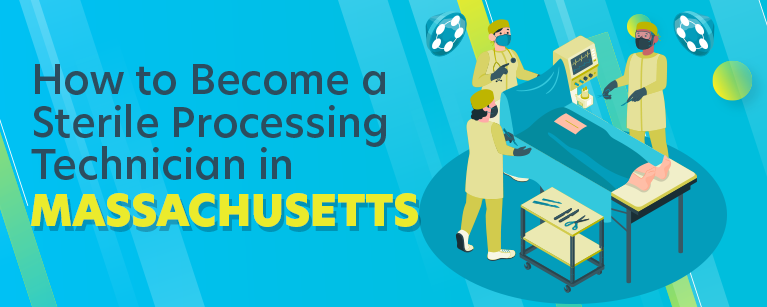
Have you ever wondered what really goes on behind the scenes at hospitals and doctor’s offices?
Sterile processing technicians, also known as surgical techs, are pros at keeping medical facilities running as smoothly as possible.
Whether it’s busy Boston hospitals seeing patients round-the-clock or rural clinics serving small towns, sterile techs have a huge responsibility.
It’s a high-pressure job, but it’s also really rewarding to know patients are in good hands.
This guide will take you on a ride through what it’s really like to be a sterile tech in Massachusetts.
From training programs to the daily grind, I’ll show you a sneak peek into these professionals’ adrenaline-filled worlds.
By the end, you’ll be hooked and ready to dive into the chaotic but crucial work yourself!
Table of Contents
How to Become a Sterile Processing Technician in Massachusetts, Step-by-Step
No day is the same for sterile processing techs in Massachusetts.
They deep clean and sterilize everything from tools to machines.
Techs also count supplies, fix any issues, and rapidly turn equipment around. Surgeries can’t happen without properly prepared gear.
Between burns, cuts, and more, these tools interact with patients daily.
So sterile technologies take safety seriously, precisely following strict rules.
Any slip could risk serious infections.
Their invisible work directly impacts outcomes.
While usually behind the scenes, techs play a vital frontline role as the last line of defense against germs before procedures.
Here are the requirements you will need to begin the process of studying as a sterile processing technician:
Education Requirements
- A high school diploma, or GED, is required. Must be at least 18 years old.
- Strong English skills are necessary to understand instructions and communicate in the medical setting.
- Personal Qualities:
- Desire to help patients by ensuring sterility of medical equipment.
- Able to follow detailed procedures carefully and maintain focus on safety.
Admission Requirements
- Proof of high school graduation or equivalent (GED/HiSET).
- Pre-requisite course credits if needed (e.g. biology, medical terminology).
- Approved immunization records showing proper vaccinations.
- Must pass a criminal background check and drug screening.
Residency Requirement
- Some programs require residency in the state where the school is located. For example, being a Massachusetts state resident.
Additional Application Materials
- Official high school or college transcripts, if applicable for credit transfer.
- CORI/SORI background check authorization forms.
- A signed health history form detailing any needed vaccinations.
This covers the minimum requirements students must fulfill to be admitted and participate in sterile processing education programs.
Meeting these ensures student readiness for the roles and responsibilities of the profession.
In-Depth Certification Process
While certification in Massachusetts is not mandatory, it is highly beneficial for career advancement.
Getting certified sets sterile techs apart from the rest.
The CRCST exam tests your understanding of germs, sanitizing to prevent infections, and how places work.
Studying is key but practice from programs really seals the learning in.
Some choose to boost prep by joining longer training courses.
Passing proves you know your stuff and follow the procedures your workplace wants.
With certification in your corner, your chances of getting hired shoot way up in Massachusetts’ hot field.
Sterile Processing Technician Schools in Massachusetts
Ready to dive into in-demand sterile/surgical technician training?
Check out these top Massachusetts programs:
Quincy College
Their $690 (SUR credits only) program is comprehensive, covering everything from microbes to machines.
Earn an 18-credit certificate that prepares you perfectly for certification success.
Justice Resource Institute
JRI’s free, 12-week training program places you straight into action with a Monday to Friday from 9 a.m. to 4 p.m. training schedule.
The course also includes 10 hours per week of hands-on training at a CSP hospital site on Wednesdays.
Perfect your skills rapidly and get connected to jobs through their connections.
Mass Bay Community College
With multiple start dates each term, Mass Bay makes sterile training flexible no matter where you live.
Classes balance book smarts with skills you can use on the job.
Massachusetts residents: $234 per credit.
This includes $24 for tuition and a $210 college fee.
Out-of-state residents: $440 per credit.
Tuition is $230 per credit, while the college fee remains $210.
New England residents: $246 per credit.
You’ll pay $36 per credit for tuition and the $210 college fee through the NEBHE program.
*The NEBHE program offers discounted tuition to residents of other New England states.
Contact Admissions for more details on qualifying for this rate.
Quinsigamond Community College in Worcester
Their certificate program can be completed in just 13 weeks.
The curriculum covers all the must-know topics, from the ins and outs of sterile processing departments to microbiology basics and how to properly handle surgical tools.
You’ll even get some hands-on learning for practical experience.
Quinsigamond emphasizes the vital infection control techniques sterile techs use.
Following the right cleaning, packaging, and sterilization methods are important for patient safety.
At $625 total, the cost is very reasonable too.
Located right in central Massachusetts, it’s easily accessible from the Worcester area.
Boston Career Institute
Designed for hospital central service roles, the program delivers hands-on training directly in medical centers.
Immerse yourself fully in the environment and techniques of the workplace.
Bunker Hill Community College
For those wanting total immersion, their program packs in every element of the education experience.
At $2795.00 for 190 course hours, dedicate yourself and master sterile processing.
Weigh factors like costs, length, campus locations, and hands-on focus to find the best fit for your learning style and career goals.
With the right program, your future in this thriving field looks bright!
Career Pathways and Advancement
The journey of a sterile processing technician job in Massachusetts does not end with certification.
There are numerous opportunities for career growth and specialization.
Technicians can advance to supervisory roles, become educators in their field, or specialize in areas like surgical instrument repair or infection control.
Continuous learning and professional development are key, with many choosing to pursue further certifications or attend workshops and seminars.
| School Name | Address |
|---|---|
| Quincy College | 1250 Hancock St, Quincy, MA 02169, United States |
| Justice Resource Institute | 160 Gould Street Suite 300 Needham, MA, United States |
| Mass Bay Community College | 50 Oakland St, Wellesley, MA 02481, United States |
| Quinsigamond Community College in Worcester | 670 W Boylston St, Worcester, MA 01606, United States |
| Boston Career Institute | 320 Washington Street 4th FL, Brookline, MA 02445, United States |
| Bunker Hill Community College | 250 Rutherford Ave, Boston, MA 02129, United States |
Salary
As a sterile processing technician in Massachusetts, you can expect a competitive salary.
According to the Bureau of Labor Statistics, the average yearly wage for sterile processing technicians in Massachusetts is $51,000.
However, salaries can vary depending on factors like location, level of experience, and employer.
Newer technicians usually start around $32,000 per year.
As you gain more years of on-the-job experience and possibly additional special certifications, your salary will increase.
Seasoned sterile processing technicians with 5–10 years under their belt commonly make $36,000 annually in Massachusetts.
Additional duties, like supervising other staff, can also result in higher pay.
Annual Salary Range:| Location | Avg. Annual Salary |
|---|---|
| Boston | $51,064 |
| Worcester | $47,828 |
| Springfield | $47,350 |
| Lowell | $49,442 |
| Cambridge | $51,064 |
| Brockton | $49,492 |
| New Bedford | $48,223 |
| Fall River | $48,223 |
| Lynn | $51,064 |
| Quincy | $51,064 |
Regional Salary in Massachusetts
| Region | Employed | Avg. Annual Salary | Avg. Hourly Pay | Top 10% Annual Salary | Bottom 10% Annual Salary |
|---|---|---|---|---|---|
| Barnstable Town, MA | 50 | $56,760 | $27.29 | $85,880 | $37,810 |
| Boston-Cambridge-Nashua, MA-NH | 1,270 | $53,920 | $25.92 | $69,830 | $40,070 |
| New Bedford, MA | 40 | $46,500 | $22.36 | $60,020 | $34,890 |
| Springfield, MA-CT | 180 | $44,610 | $21.45 | $59,680 | $36,380 |
| Worcester, MA-CT | 110 | $50,460 | $24.26 | $64,800 | $36,300 |
* Employment conditions in your area may vary.
Frequently Asked Questions
How does certification impact job opportunities in Massachusetts?
While not required, certification significantly boosts employment prospects and the potential for advancement.
How can I get clinical experience in Massachusetts?
Many sterile processing programs in MA require clinical rotations at local hospitals.
Bunker Hill CC, Quincy College, and MassBay CC partner directly with hospitals to provide hands-on training opportunities for students.
You can also inquire about volunteer or intern roles at medical facilities.
What is the job market like in Massachusetts?
The outlook for sterile processing technicians is very positive in Massachusetts.
With an aging population requiring more medical care, demand is high.
Massachusetts hospitals employ over 1,200 sterile processing technicians alone.
Major metro areas like Boston, Worcester, and Springfield typically have the most openings.
With certification, your chances of finding a job are strong.
Sterile Processing Technician Info by State
- Alabama
- Alaska
- Arizona
- Arkansas
- California
- Colorado
- Connecticut
- Delaware
- Florida
- Georgia
- Hawaii
- Idaho
- Illinois
- Indiana
- Iowa
- Kansas
- Kentucky
- Louisiana
- Maine
- Maryland
- Massachusetts
- Michigan
- Minnesota
- Mississippi
- Missouri
- Montana
- Nebraska
- Nevada
- New Hampshire
- New Jersey
- New Mexico
- New York
- North Carolina
- North Dakota
- Ohio
- Oklahoma
- Oregon
- Pennsylvania
- Rhode Island
- South Carolina
- South Dakota
- Tennessee
- Texas
- Utah
- Vermont
- Virginia
- Washington
- West Virginia
- Wisconsin
- Wyoming









